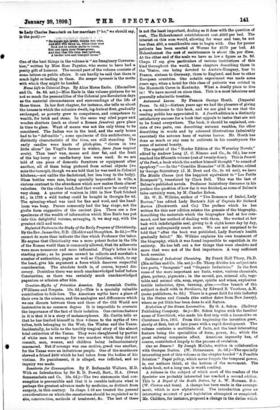Autumnal Leaves. By Francis George Heath. (Imperial Press. Is. 6d.)—Sixteen
years ago we had the pleasure of giving a warm welcome to this book, and we are glad to see that the reading public has appreciated it. A fourth edition is a distinctly satisfactory success for a book that appeals to tastes that are not to be found everywhere. The book, it should be explained, con- sists of two parts, one describing autumn rambles, the other describing in words and by coloured illustrations (admirably executed) the autumn hues of various leaves. Mr. Heath has done as much as any man to cultivate in his countrymen the sense of natural beauty.
The reprint of the "Border Edition of the Waverley Novels," edited by Andrew Lang (J. C. Nimmo and Co., 3s. 6d.), has now reached the fifteenth volume (out of twenty-four). This is Peveril of the Peak, a book which the author himself thought "to smack of apoplexy."—In the" Comedie Humaine " of H. de Baleac, edited by George Saintsbury (J. M. Dent and Co., 38 6d net), we have The Middle Classes (not the happiest equivalent to "Les Petits Bourgeois"), translated by Clara Bell. This was the last of Balzac's published novels. Professor Saintsbury discusses in his preface the question of how far it was finished, as some of Balzac'e tales certainly were, by M. Charles Rabon.
Mr. W. H. Wilkins, author of "The Romance of Isabel, Lady Burton," has edited Lady Burton's Life of Captain Sir Richard Burton (Duckworth and Co.) The preface which he has written for this new edition relates the genesis of the biography, describing the materials which the biographer had at her com- mand, and her method of dealing with them. She worked at her task with indefatigable zeal, giving to it eight hours day by day, and not unfrequently much more. We are not surprised to be told that " after the book was published, Lady Burton's health gradually failed." Mr. Wilkins explains his own treatment of the biography, which it was found impossible to republish in its entirety. He has left out a few things that were obsolete and more that were not of the first importance. A very sufficient book remains.


















































 Previous page
Previous page